[Tesla] spent days in a park surrounded by the creatures that mattered most to him—pigeons—and his sleepless nights working over mathematical equations and scientific problems in his head. That habit would confound scientists and scholars for decades after he died, in 1943. His inventions were designed and perfected in his imagination.
Tesla believed his mind to be without equal, and he wasn’t above chiding his contemporaries, such as Thomas Edison, who once hired him. “If Edison had a needle to find in a haystack,” Tesla once wrote, “he would proceed at once with the diligence of the bee to examine straw after straw until he found the object of his search. I was a sorry witness of such doing that a little theory and calculation would have saved him ninety percent of his labor.”
The Rise and Fall of Nikola Tesla and His Tower then laments Tesla’s lack of a “mind for business,” something his contemporaries apparently possessed and what allowed them to become successful. But the quotation seems to point to something else Tesla lacked: an ability to focus on real-world solutions to problems, even when they seemed unsexy. But then, who wouldn’t prefer to spend a day lost in flights of theoretical fancy with pigeons in park?
The entire article seems to illustrate something else too. Rebekah Higgitt points out that we frequently try to resuscitate certain historical figures who, we think, have been slighted by more famous people:
If someone usually held in high regard (Tudor monarchs, Shakespeare) is thought responsible for the oppression of a rediscovered, wronged hero, then identification with and emotional attachment to the story can become particularly intense. This is true of the mission to rescue Richard, and in history of science examples are Robert Hooke and Nikolai Tesla, seen as victims of Isaac Newton and Thomas Edison respectively.
What does our current frenzy of support for Tesla, $1.3 million dollars were donated to build a museum for the greatest geek who ever lived, reveal about us? How does it reflect our values and concerns? And how does our representation of Tesla’s adversaries—Edison, Westinghouse, Marconi, etc.—also reflect our values?
